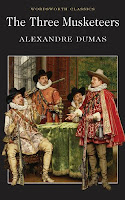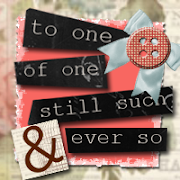I didn't believe in love
at the first sight. And then there was Athos.
“You have sent for me, Sir,” said
Athos to M. de Treville, in a feeble yet perfectly calm voice, “you
have sent for me, as my comrades inform me, and I have hastened to
receive your orders. I am here; what do you want with me?”
Thus he appeared, majestically,
heroically, before M. De Treville. His being wounded to the point of
dying makes his appearance even more commendable.
He's the oldest of the three, the most
silent and the most grim. He even has a lackey, a man called Grimaud,
whom Athos has “trained in his service in a thoroughly
peculiar fashion,” that is to say, to serve without a sound. I even
start to think that they communicate through telepathy.
Alright, to make this post more
systematic, and easy to read, let me divide my impression in several
little headings.
His looks
He is young, about 30, of “great
personal beauty and intelligence of mind.” But of his mind we will
talk later. He always makes sure his apparel is worthy of his being a
Musketeer and a descendant of ancient nobles albeit he never pays
much attention to his looks.
“He was of middle height; but his
person was so admirably shaped and so well proportioned that more
than once in his struggles with Porthos he had overcome the giant
whose physical strength was proverbial among the Musketeers. His
head, with piercing eyes, a straight nose, a chin cut like that of
Brutus, had altogether an indefinable character of grandeur and
grace. His hands, of which he took little care, were the despair of
Aramis, who cultivated his with almond paste and perfumed oil. The
sound of his voice was at once penetrating and melodious; and then,
that which was inconceivable in Athos, who was always retiring, was
that delicate knowledge of the world and of the usages of the most
brilliant society — those manners of a high degree which appeared,
as if unconsciously to himself, in his least actions.”
His personality
 |
Matthew Macfayden as Athos
(The Three Musketeers 2011) |
Athos is weird. Even his friends say
so. As stated before, he scarcely talks, and talks only as much as he
needs to say, no more. He trains his lackey to obey his gesture, and
I can imagine his house as a very quiet silent place, with neither
him nor Grimaud, his lackey, uttering a single word except very
necessary.
But as a proverb in my country says,
“Calm water sweeps away swifter still.” Athos silence hides many
great qualities that any man would respect and envy at the same time.
First of all, he is brave. His courage
is one of the greatest trait one should look in a Musketeer. He is
always ready to fight, even when he is badly wounded, as you can see
in the opening of this post. He is not afraid, even of the cardinal,
upon whose heart he places a singular blow, when he is so desirous to
safe a letter that compromises his friends, calmly said,
“Monseigneur, the letter is a woman’s letter, but it is neither
signed Marion de Lorme, nor Madame d’Aiguillon.” Both lady have
love affairs with the cardinal.
This quality, combined with his brilliant mind, produces an excellent man in him. Athos, with his vast
knowledge, deep wisdom, and clever strategy would flourish in his
military career or anything he likes to choose to do. Still more, he
qualifies to be one of the greatest comtes
in France. He knows etiquette by heart, and no one can deceive him
upon heraldry. I can assure you that both matters are so complex you
don't even want to let me start babbling about both. (Now I remember
that I still have some posts about coat-of-arms to do.) And the point
that makes me love me even more: he understands Latin.
“If a repast were on foot, Athos
presided over it better than any other, placing every guest exactly
in the rank which his ancestors had earned for him or that he had
made for himself. If a question in heraldry were started, Athos knew
all the noble families of the kingdom, their genealogy, their
alliances, their coats of arms, and the origin of them. Etiquette had
no minutiae unknown to him. He knew what were the rights of the great
land owners. He was profoundly versed in hunting and falconry, and
had one day when conversing on this great art astonished even Louis
XIII himself, who took a pride in being considered a past master
therein.
Like all the great nobles of that
period, Athos rode and fenced to perfection. But still further, his
education had been so little neglected, even with respect to
scholastic studies, so rare at this time among gentlemen, that he
smiled at the scraps of Latin which Aramis sported and which Porthos
pretended to understand. Two or three times, even, to the great
astonishment of his friends, he had, when Aramis allowed some
rudimental error to escape him, replaced a verb in its right tense
and a noun in its case. Besides, his probity was irreproachable, in
an age in which soldiers compromised so easily with their religion
and their consciences, lovers with the rigorous delicacy of our era,
and the poor with God’s Seventh Commandment. This Athos, then, was
a very extraordinary man.”
Some more things to say. He never
borrows money, though he would lend money easily for his friends. He
drinks, but rarely drunk. He doesn't have any mistress, something I
find very honourable indeed. He has fatherly tender affection for the
young d'Artagnan. He is certainly one of the most exemplary soldier.
His past
Nobody's perfect, and so is Athos. His
excellent qualities would make him perfect if not for his dark demon
that lives inside his soul. His friends notice that Athos dislike any
discussion upon women, and at times, he would stay alone,
undisturbed, in the corner of the room, drinking all by himself with
a complexion that would move anyone to a mixture of pity and fear.
"Then the demigod vanished; he remained
scarcely a man. His head hanging down, his eye dull, his speech slow
and painful, Athos would look for hours together at his bottle, his
glass, or at Grimaud, who, accustomed to obey him by signs, read in
the faint glance of his master his least desire, and satisfied it
immediately. If the four friends were assembled at one of these
moments, a word, thrown forth occasionally with a violent effort, was
the share Athos furnished to the conversation. In exchange for his
silence Athos drank enough for four, and without appearing to be
otherwise affected by wine than by a more marked constriction of the
brow and by a deeper sadness"
It's Milady. Both of them are united in
the middle of a secret that nobady knows, but those two. Because of
that lady, Athos leaves his home, his land, and his title to become a
humble musketeer. But, as Dumas believe, God is just. He doesn't
leave unpunished those who commit sin deliberately.
So, can you imagine my face when I read
his name on the page? Yes, rosy red. I bet the cardinal would love to
give 20 of his best men for this man's service, and a hundred at
least in exchange of the four in package. But for me, give me Athos,
and do what you will with the rest.
Wait! Maybe, I'll take all four.
--------------------------
Character Thursday
Adalah book blog hop di mana setiap blog memposting tokoh pilihan dalam buku yang sedang atau telah dibaca selama seminggu terakhir (judul atau genre buku bebas).
- Kalian bisa menjelaskan mengapa kalian suka/benci tokoh itu, sekilas kepribadian si tokoh, atau peranannya dalam keseluruhan kisah.
- Jangan lupa mencantumkan juga cover buku yang tokohnya kalian ambil.
- Kalau buku itu sudah difilmkan, kalian juga bisa mencantumkan foto si tokoh dalam film, atau foto aktor/aktris yang kalian anggap cocok dengan kepribadian si tokoh.
Syarat Mengikuti :
1. Follow blog Fanda Classiclit sebagai host, bisa lewat Google Friend Connect (GFC) atau sign up via e-mail (ada di sidebar paling kanan). Dengan follow blog ini, kalian akan selalu tahu setiap kali blog ini mengadakan Character Thursday Blog Hop.
2. Letakkan button Character Thursday Blog Hop di posting kalian atau di sidebar blog, supaya follower kalian juga bisa menemukan blog hop ini. Kodenya bisa diambil di kotak di button.
3. Buat posting dengan menyertakan copy-paste “Character Thursday” dan “Syarat Mengikuti” ke dalam postingmu.
3. Isikan link (URL) posting kalian ke Linky di bawah ini. Cantumkan nama dengan format: Nama blogger @ nama blog, misalnya: Fanda @ Fanda Classiclit.
4. Jangan lupa kunjungi blog-blog peserta lain, dan temukan tokoh-tokoh pilihan mereka. Dengan begini, wawasan kita akan bertambah juga dengan buku-buku baru yang menarik


































